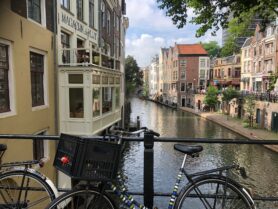Programme
The 17th Annual Conference of the European Society of International Law will convene in Utrecht in the Netherlands from Thursday 1 September to Saturday 3 September 2022. The main conference will be preceded by various workshops organised by the Society’s Interest Groups on 31 August 2022 and 1 September.
You can now download the full programme (PDF) of the 2022 ESIL Conference.
Please note, the programme below could be subject to last minute changes!
Programme
Wednesday 31 August
9.00-18.00 IG events and meetings

On Wednesday we are organizing pre-conference workshops.
All the IG workshops will take place at Janskerkhof 3 in Utrecht. On the pre-conference page, you can find the programmes of the workshops.
Important information for online participants: Online links to hybrid workshops will be sent to all registered participants.
Thursday 1 September
9.00-12.00 IG events and meetings
12.00-18.00 Registration
13.00-13.45 Welcome addresses and presentation of the theme by the local organisers
- H. Kummeling, Rector Magnificus of Utrecht University
- I. Giesen, Head of Utrecht Law School
- L. Lijnzaad, Judge at the International Tribunal for the Law of the Sea, Maastricht University
- S. Trevisanut, Utrecht University, local organiser
13.45-15.00 Inaugural Panel – How exclusive is international law? The state of affairs
Chair: C. Ryngaert (Utrecht University)
- E. T. Achiume (UCLA)
- J. Nijman (University of Amsterdam/Asser Institute)
- J.M. Thouvenin (The Hague Academy of International Law)
15.00-15.30 coffee break
15.30-16.45 Parallel sessions
Forum 1 – Methodologies for the Identification and Assessment of In/ex-clusiveness
Dictionaries define the term ‘inclusive’ as ‘not excluding any of the parties or groups involved in something’. Accordingly, inclusive international law includes all relevant parties in its processes of law-making, law-enforcement, and dispute-settlement. How should we identify these relevant parties, and how should their appropriate level of involvement in international law be assessed?
Chair: M. Shahabuddin (University of Birmingham)
-
- E. Hey (Erasmus University) Engaging with other disciplines in legal analysis
- G. Baars (City, University of London) Cruising International Law’s Cruel Optimism: The ‘dark past’, the fake apology, reparations and the abolitionist movement
Forum 2 In/ex-clusiveness in the Construction of the History of International Law
There is a resurgence of academic interest in the history of international law. There is clearly a desire to better understand the origins of the discipline. However, attention tends to focus on the European roots of international law. How can the construction of the history of international law be made more inclusive?
Chair: A. Peters (Max Planck Institute, Heidelberg)
-
- I. de la Rasilla (University of Wuhan) A Very Short History of Women in International Law
- H. de Waele (University of Nijmegen) Black holes and revelations. How in/exclusion shapes international law history discourse
- L. Obregon (Universidad de los Andes) Teaching and Writing International Legal History: A Test of the Discipline’s In-ex-clusiveness
17.00-18.15 Parallel sessions
Agora 1 – In/ex-clusiveness in Personality and Actors in International Law
NGOs, non-state armed groups, multinational corporations, professional associations, certification and insurance companies, etc. have increasingly gained agency in international decision-making processes and in the enforcement of international law, at the international and domestic levels. Should international legal personality be more inclusive? Are there alternative approaches to personality and subjectivity?
Chair: N. Tzouvala (Australian National University)
-
- D. Hughes (Canadian Forces College/University of Toronto) & Y. Shereshevsky (University of Haifa): State-Academic Lawmaking
- G. Lythgoe (University of Manchester): Territory as International Law’s Shibboleth or: The International Lawyer’s Guide to Eradicating the Exceptional ‘Sui Generis’ Entity
- M. Shinde (University of Cologne): The Ecocidal Corporation as Subject To and as a Subject to International Criminal Law
Agora 2 – In/ex-clusiveness in the Interpretation of International Law
The dichotomy between a formalistic versus non-formalistic approach to the application and interpretation of international law still permeates international practice and scholarship. This agora engages with this dichotomy and/or considers possible ‘third’ approaches to interpretation.
Chair: F. Zarbyiev (Graduate Institute of Geneva)
-
- B. Etkin (Université Paris II Panthéon-Assas): In/Excluding Pragmatics: Interpretative Formalism and Its Discontents
- B. Pegorari (University of New South Wales Sydney): ‘Exclusionary Inclusiveness’: A Critique of the Inter-American Court of Human Rights’ Interpretative Approach to Indigenous Peoples’ Rights
- V. Tzevelekos (University of Liverpool) & K. Istrefi (Utrecht University): In/Ex-clusiveness in the Interpretation of the ECHR for the Purposes of the Establishment of Common European Human Rights Standards through European Consensus
Agora 3 – IG proposed panel International Law and Culture – In/ex-clusiveness of Diversity in International Law
Chair: A. Jakubowski (Opole University)
-
- A. Alves (University of New South Wales)
- Y. Donders (University of Amsterdam/Commissioner at the Netherlands Human Rights Institute).
- E. Polymenopoulou (Hamad Bin Khalifa University)
18.30-20.00 Welcome reception at the University Hall (Academiegebouw)
- F. Soons (Utrecht University)

Friday 2 September
08.00-09.00 Breakfast Meeting: ESIL Board with New Members
Location: Pandora
9.00-10.15 Parallel sessions
Agora 4 – In/ex-clusiveness in International Adjudication
Legal standing in front of international courts and tribunals is still limited for non-state actors. Moreover, international benches tend to lack diversity, in terms of gender, race, national and cultural backgrounds, and class. International adjudication can also emphasise the inequalities between states and, thus, impact actual participation in judicial proceedings. This agora addresses the many facets of international adjudication and its inclusiveness or lack thereof.
Chair: T. Pasipanodya (Foley Hoag LLP)
- B. Menezes Queiroz & M. Vicente (Universidade Católica Portuguesa): Are Women ‘offside’?Achieving Gender Parity in Sports Dispute Settlement
- C. Espaliu Berdud (Universidad Antonio de Nebrija): Ex-clusiveness in International Adjudication: The Legitimacy of Permanent Members of the Security Council at the Bench of the International Court of Justice?
- T. Soave (Central European University): Cracks in the Ivory Tower: Exclusivity and Inclusivity in the International Judicial Profession
Agora 5 – In/ex-clusiveness in Right-Holders and Protected Persons
Who has rights pursuant to international law? Should elements of nature or animal species also have rights? Is a right-based approach to protect individuals or elements of nature always the answer? This agora strives to answer these questions by discussing who/what international law protects and through which legal framing the object/subject of protection should be viewed.
Chair: M. Hébié (University of Leiden)
- M. Barletta (University of Rome): The Benefits and Drawbacks of a Wider Inclusion of Protected Subjects under the International Law
- A.R. Harrington (Lancaster University): Future Generations as Rightsholders: Advances and Uncertainties
- E. Jones (University of Essex): The Rights of Nature in International Law: Transforming the Meaning of Rights
Agora 6 IG The European as a Global Actor – EU Exceptionalism and the In/ex-clusiveness of International Law
Chair: P. Cebulak (University of Amsterdam)
- K. Ziegler (University of Leicester) EU “Exceptionalism” and the Paradox of Inclusiveness of International Law
- J. Odermatt (City, University of London) EU Exceptionalism in International Dispute Settlement
- T. Cabrita (University of Amsterdam / KU Leuven), EU Exceptionalism and the Codification of International Disaster Law
10.15-10.45 Coffee break
10.45-12.00 Parallel sessions
Agora 7 – In/ex-clusiveness in Economic Ideologies and Perspectives
International law is not economically neutral. Capitalist and neoliberal ideologies have greatly influenced the development of international law, specifically since the end of World War II. Like any ideology, they have buttressed certain interests and protected certain actors. Who/what has been in/excluded from the developments of international law buttressed by the different economic ideologies and perspectives? Which economic ideologies are currently influencing the development of international law, and how?
Chair: M. Salomon (London School of Economics)
- O. Baillet (Max Planck Institute Luxembourg): The European Court of Human Rights and Economics: Does Political Liberalism entail Economic Liberalism?
- H. Eklund (University of Copenhagen): Excluding People and Including Resources: Colonialism in the Treaty of Rome
- R. Brown (University of Cambridge): Neoliberalism in Global Health Law: Past, Present and Future
Agora 8 In/ex-clusiveness in the Legal Construction of Sustainable Environment
Sustainable development presupposed interlinkages between the protection of the environment, the protection of human rights, and international economic law. International environmental law has thus been framed as tightly connected to economic development. It remains unclear, however, what a sustainable environment is from a legal perspective and what the legal nature of sustainable development is.
Chair: S. Boysen (Helmut Schmidt University, Hamburg)
- C. Ceretelli (University of Padua): Discussing the Limits of Sustainable Development: Is the Time Ripe for the Inclusion of Indigenous Peoples?
- J. Bendel (University of Copenhagen) & G. Jokubauskaite (University of Glasgow): Sustainable Forests? The Exclusion of Land Rights from International Environmental Law
- E. Boshoff (University of Oslo): An Emerging Right to Sustainable Development – Where Do We Stand?
Agora 9 In/ex-clusiveness in the Legal Construction of Violence and Security
Location: Pandora
International law has dealt with the security of states and the violence perpetrated by states since its very beginning. Many scholars and practitioners have highlighted the weaknesses and limitations of the international legal framework in tackling other forms of violence perpetrated by non-state actors, and threats to their security. How is international law dealing with violence targeting social groups and minorities, with violence perpetrated by non-state actors, and with guaranteeing the security of non-state actors, social groups and minorities?
Chair: P. Grzebyk (University of Warsaw)
Speakers:
- P. Thielbörger (Hertie School/Ruhr-Universität Bochum): Including or Excluding Climate Change as a Responsibility of the Security Council?
- C. Wittke & E. Bescotti (Leibniz Institute for East and Southeast European Studies): International Law’s Role in Political Violence and the Destabilization of Unresolved Secessionist Conflicts in the Post-Soviet Space
12.00-13.30 Lunch break, Mentoring event
12.45–13.30 Business meeting editors and publishers (closed)
Location: Pandora
13.30-14.45 ESIL General Assembly, including elections for new Board members
Location: Ronda
14.45-15.30 coffee break
14.45-15.30 Meet the Editors and Publishers of International Law Journals! (open to all)
Location: Pandora
15.30 -16.45 Parallel sessions
Forum 3 – In/ex-clusiveness in International Law Making
Location: Pandora
In the traditional understanding of international law, states are the lawmakers, with some limited involvement of international organizations. At the same time, it is acknowledged that various non-state actors, such as corporations, non-governmental organizations, religious groups, and even armed groups, play a role in global governance. Is there a need to open up international law-making processes to these actors? How should such processes be reconceptualized so as to accommodate new actors?
Chair: N. Klein (New South Wales University)
- J. Pauwelyn (Universtiy of Geneva); Taking stakeholder engagement in international lawmaking seriously: Lessons from global health, finance and trade governance
- M. Takeuchi (Universtiy of Kobe); In/Ex-clusiveness in the Governmental Networks’ Involvement in the International Law Making: Financial Action Task Force as an Invisible Actor
Forum 4 – In/ex-clusiveness in University Curricula on International Law
Location: Pandora
University curricula in international law tend to focus on the practice of a limited number of Western (and often Anglo-Saxon) states, with little attention being paid to potentially original contributions of the non-West. In addition, the dominant frame of studying international law remains positivism. How can the university curriculum be decolonized, and how can space be created for other theoretical approaches to studying international law?
Chair: P. Okawa (Queen Mary University of London)
- J. Fraser (Utrecht University) Context, Power and Positionality: International Law in the Classroom
- L. Mälksoo (University of Tartu) Teaching History of International Law and Questions of Inclusion/Exclusion
- M. Al Attar (University of Warwick) The Dialectics of Decolonisation: Between Entrapment and Rupture
17.00-18.30 Parallel sessions
Forum 5 – In/ex-clusiveness of International Legal Knowledge
Judicial decisions, doctrine and expert reports all create international legal knowledge. However, a large part of this knowledge appears to be generated by members of an in-crowd. Degrees from top law schools in particular countries, good connections with established knowledge-producers, and an almost impeccable command of academic English and/or French offer a path towards membership. What are the exclusionary practices at play here, and how could this be remedied?
Chair: C. Schwobel-Patel (Warwick University)
- A. Rasulov (University of Glasgow); Knowledge protocols, scholarly genres, and core-periphery dynamics: the political economy of international law scholarship
- K. M. Clarke (University of Toronto) Thinking Justice and Law Otherwise
Forum 6 – (to be determined on the basis of current events)
19.00-22.00 Conference Dinner
Location: Pandora
Saturday 3 September
9.00-10.15 Parallel sessions
Agora 10 In/ex-clusiveness of the Legal Construction of the Commons
Why are the commons common? Who participates in the decision-making processes? Who benefits from their management and exploitation? Who should address and remedy problems? This agora welcomes papers which offer answers to these and related questions on how international law has construed the concept of, and manages, the ‘commons’.
Chair: L. Kotzé (North-West University, South Africa)
-
- G. E. Exarchou (George Washington University): Allocation of the Radio Spectrum and Satellite Orbits: Jurisprudential Perspectives
- M. Eccleston-Turner (King’s College London): Pathogen Sequence Information as a Commons in International Law
Agora 11 In/ex-clusiveness in the Legal Construction of Borders
Borders in international law are stable and objective: delimitation treaties are binding erga omnes and they are not affected by state succession. Their stability and thus rigidity have however jeopardized the respect of fundamental principles, such as the principle of self-determination of people, and are now debated in relation due to territorial changes and forced migrations caused by climate change.
Chair: K.-G. Lee (Seoul National University / International Law Commission)
-
- M. Saliternik (Netanya Academic College) & S. Shlomo Agon (Bar-Ilan University): Fluctuating Borders, Borderless Spaces, and International Legal Geography
- O. Semenova (Maastricht University): Fundamental Change of Circumstances and Maritime Zones and Boundaries
Agora 12 In/ex-clusiveness of the Legal Construction of Justice
Which type(s) of justice is international law enabling/pursuing? Who are the beneficiaries of this justice? Which are the institutions involved in legally guaranteeing justice at the international level? Who controls the guarantor?
Chair: I. Venzke (University of Amsterdam)
- D. M. Amann (University of Georgia): Absent at the Creation? Women and International Criminal Justice
- P. Wilinski (Erasmus University): Is There a Room for Distributive Justice under International Investment Law?
- A. Ferrara (Irish Centre for Human Rights): Evolving Conceptions of Justice and International Law
10.30-11.15 Conversation with the 2022 winners of the ESIL Monograph Prize and the ESIL Collaborative Book Prize
11.15-11.45 Coffee break
11.45-12.45 Closing roundtable – The inclusiveness of international law: The way forward
Chair: M. Kanetake (Utrecht University)
Speakers:
- W. Ferchichi (Université de Carthage)
- T. Skouteris (American University in Cairo)
- N.N. Negm (African Union)
12.45-13.30 Conclusions
- Utrecht University (organizers)
- R.A. Wessel, Vice-President, European Society of International Law
- Presentation of the 18th Annual Conference of ESIL in Aix-en-Provence
13.30-14.30 Light lunch




